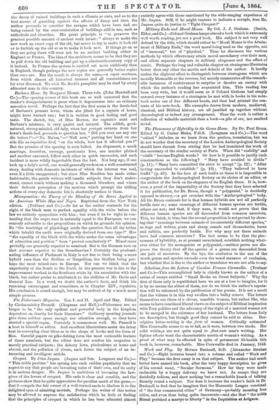The Phenomena of Hybridity in the Genus Homo. Dy Dr.
Paul Broca. Edited by G. Carter Blake, F.G.S. (Longman and Co.)—The word " edited " includes, as we learn from the preface, translation, but we do not wonder that the secretary of the London Anthropological Society should have shrunk from stating that he had translated the work of the secretary of the similar society at Paris. When did "viability" and "viable become English words ? Or how is it possible to justify such constructions as the following? "Many have avoided to divide" (p. 11); "Many have committed the error to accept" (p. 12) ; "Alter having succeeded to establish" (p. 13) ; "They believed to have fotuld " (p. 62). In the face ef such faults as these it is impossible to congratulate the Anthropological Society on its choice of an editor, or the author of the book on the elegance of its English dress. It is, how- ever, a proof of the impartiality of the Society that they have selected it for publication, for Dr. Broca, though a "polygenist," is decidedly opposed to slavery,—a pet crotchet with the " Anthropological " body. All Dr. Broca contends for is that human hybrids are not all perfectly fertile inter Se; some crossings of different human species are fertile, others are not; and that, if they were, it would not prove that the different human species are all descended from common ancestors. This, we think, is true, but the second proposition is not proved by show- ing that "crossings between animals of incontestably different species," as dogs and wolves, goats and sheep, camels and dromedaries, hares and rabbits, are perfectly fertile. For why may not these animals have had common ancestors ? The fact seems to be that the phe- nomena of hybridity, as at present ascertained, establish nothing what- ever either for the monogenist or polygenist,—neither prove nor dis- prove the theory that all the species of a genus are descended from one pair of ancestors. By the bye, the confusion in the use of the words genus and species exceeds even the usual measure of confusion, but whether that is due to the author or translator we are not able to say. Selections from the Letters of Caroline Frances Cornwallis. (Trubner and Co.)—This accomplished lady is chiefly known as the author of a series of essays entitled "Small Books on Great Subjects." Why the first of these only is republished here we are at a loss to imagine, for it is by no means the ablest of them, nor do we think the author's reputa- tion will be enhanced by the publication of her poems. It is not a merit that the volume is in this way swollen into a bulky octavo. The letters themselves are those of a clever, sensible woman, but rather blue, who seems to have combined liberal views on the subject of Biblical inspiration with Tory politics and the advocacy of the right of a married woman not to be merged in the existence of her husband. The letters from Italy are descriptive, but though good they cannot ba said to shine. Des- criptive letter-writing is the forte of women. Critically estimated Miss Cornwallis seems to us to fall, as it were, between two stools. Her solid writings are not quite equal to fat-rate man's writing. Her






























 Previous page
Previous page